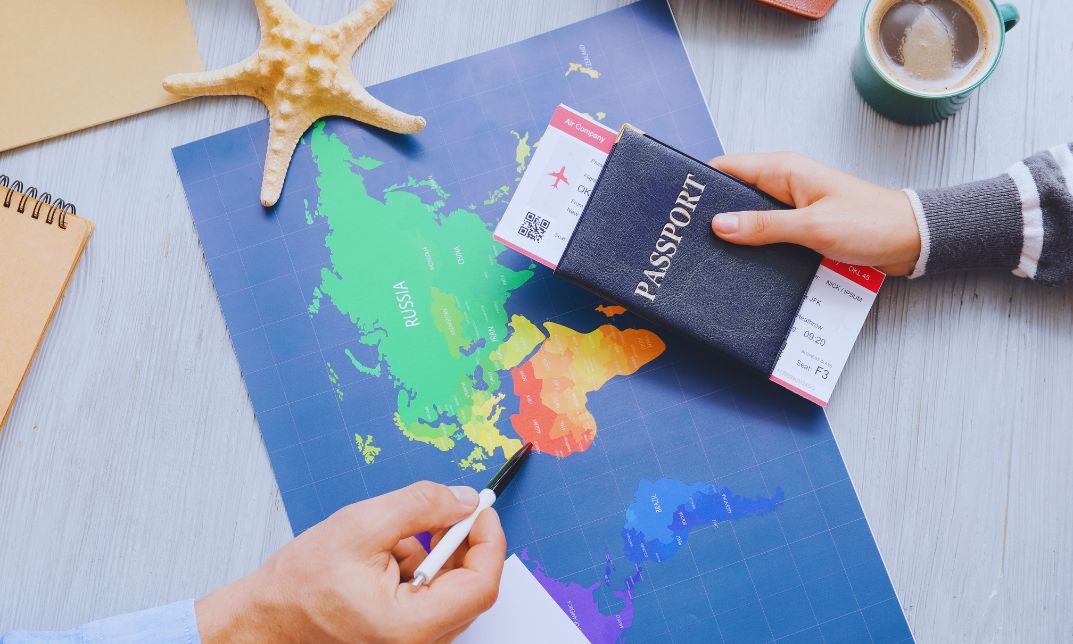No products in the basket.
Ever catch yourself daydreaming about turning your love for travel into a real job? Just picture planning incredible holidays for people—all while working from your sofa in pyjamas. The UK travel world is buzzing in 2026, and it’s opening up loads of chances for new independent travel agents. People want trips that feel personal and different (without breaking the bank), and that’s where you come in. Or more to the point, how to become a independent travel agent UK-style in 2026? Let’s break it down.
Why Go Independent? It’s Your Adventure!
If you’ve ever wondered how to be an independent travel agent, here’s the scoop: going independent basically means you’re the boss. You plan trips, make money, and call the shots. You set your hours, work as much—or as little—as you want. Most people start small and grow into full-time gigs. That kind of flexibility? It’s gold. You can work from anywhere, go at your own pace, and actually enjoy your job. Also, there is no cap on how much you can earn. Yep, the sky’s the limit.
How to Become a Independent Travel Agent

One of your first big choices? Figuring out how you want to run things. Funny enough, most “independent” agents don’t fly totally solo—they team up with a host agency or join a travel group. Going completely alone is doable, but honestly? It’s pricey and packed with legal headaches.
Partnering with a Host Agency
Think of a host agency like your behind-the-scenes buddy. You’re still your own brand, but you get to use their tools, systems, and industry hookups. It saves you a ton of stress—and money.
Here’s what they’ve got for you:
- Supplier Deals: You instantly tap into top travel suppliers. That means better prices and sweet exclusive deals—connections that would take you ages to build on your own.
- Training & Mentoring: They’ve got ongoing training to help you learn the ropes—or level up if you’re already in the game. Boosts your skills and your confidence.
- Ready-Made Systems: Host agencies take care of the boring backend stuff. Booking tools? Check. Invoicing software? Got it. Legal templates? Yep. Even marketing materials. They make commission payments easy so you’re not chasing hotels down for your money.
- Legal Help: Stressed about rules? They guide you through licenses, and a lot offer ATOL protection and ABTA help. That’s a big win.
- Community: You’re not alone. You’ll join a group of other agents where you can swap tips, stories, and support.
- IATA Access: This little number is crucial for earning airline commissions—and it’s a pain to get on your own. Hosts already have it.
What’s the catch? You’ll pay a one-time setup fee—around £142 to £179.99—plus a monthly fee (usually £32 to £39.95). You also split your commission. Most hosts do an 80/20 split, so you keep 70–80%. Not bad.
Joining a Travel Consortium
Consortiums are like travel clubs for businesses. Independent agents join forces to get better deals and stay competitive with the big players.
Why join one?
- More Money: Better group deals = more profit. Advantage Travel Partnership, for example, has over 250 supplier deals.
- Marketing Help: They help you find clients and keep them coming back with slick marketing support.
- Business Support: You get a go-to person for help and advice, even with stuff like business planning.
- Networking: Meet others in the biz, share tips, and build your community.
- Financial Protection: They can help with ABTA/ATOL stuff and sort out your payment systems.
Some consortia won’t charge you upfront. They just take a small cut—usually around 10% of your net commission.
Going Fully Independent
Sure, you can go it alone—but fair warning, it’s a lot. You’ll need a decent chunk of cash to get started, and you’re on your own for support. Getting an IATA number? That’s tough. Trying to make deals with airlines? Even harder—they expect loads of bookings. Plus, you’re in charge of all the legal stuff. Most smart agents team up with someone.

Money Talk: What to Expect
Let’s talk costs. Running your own travel biz takes planning. Your startup and monthly bills will depend on how you do it.
Startup Costs (ballpark):
- Home Office: You’ll need a laptop, fast internet, and good tools for staying in touch.
- Business Registration: Expect to pay £80–£240 to get your biz officially set up.
- Travel agency license: If your niche requires it, budget around £80–£400.
- Website: A pro-looking website could set you back £400–£1,600.
- Booking Software: These tools cost about £40–£120 a month.
- Memberships: Joining groups like ASTA or CLIA gives you support and networking.
Altogether, starting from home might cost you £1,250–£3,500. Monthly running costs? Think £160–£600.
ABTA and ATOL Specific Fees:
- ABTA: £750 to apply (plus VAT), and a £1,250 joining fee.
- ATOL: £300 app fee (plus VAT), £1,223 a year for a Small Business ATOL, and £2.50 APC per traveller.
How Much Can You Earn?
This is the fun part. There’s no set cap on your earnings.
- Average Income: As of June 2026, the average UK independent travel agent makes around £24,172 a year—or £2,014 a month. That’s more than most general travel agents. The pros make over £30K.
- Commission: You earn a cut from suppliers—usually 10%–28% of the trip cost. With a host agency, you keep 70–80% of that.
- A £2,800 family trip might bring in £274.
- A £2,500 cruise could land you £280.
- Insurance pays 25–28%, cruises pay 10–18%, and hotels give 8–15%.

Rules You Must Know
Legal stuff can be dull, but it’s got to be done. There’s no general “travel agent license” in the UK—but there are other rules to follow.
- Business Structure: Be a sole trader (simple, but risky), or go Ltd (safer for your personal stuff). Most agents go Limited Company.
- ATOL: If you’re selling holidays that include flights, this one’s a must. It protects your clients if your company crashes. Issued by the CAA.
- You need a written agreement with your ATOL holder.
- Give your clients an ATOL Certificate right away.
- Make sure receipts show the money is protected.
- ABTA: Not required by law, but super helpful. It protects non-flight holidays and adds trust. You also get legal help and crisis support.
- Package Travel Regulations: You’ve got to protect client money. That could mean a bond, insurance, or a trust account.
- UK GDPR: Handle personal info? Then you need to follow this. Register with the ICO and keep data safe.
- DMCCA (2024): This one’s huge. Started in April 2026. The CMA can now fine you without going to court.
- No Drip Pricing: Show total prices upfront—no sneaky fees later.
- No Fake Reviews: These are banned too.
- Big Fines: 10% of global income or £300K. Ouch.
- Act Fast: Check your website, booking steps, and prices. Be super clear.
- ETA (Electronic Travel Authorisation): New rule for non-UK passport holders as of Jan 2026. It’s £10. Make sure your clients know.
- RDG Licence: Needed if you’re selling train tickets.
- Insurance: Get both professional indemnity and public liability insurance. Just in case.
Skills You Need to Shine In
To really stand out as a independent travel agent, you’ll need to wear a lot of hats—and keep learning while you’re at it.
- Customer Service: Really listen to your clients. Give them good info. Be open and clear.
- Communication: Talk and write clearly. Be easy to understand.
- Attention to Detail: Catch the small stuff. Know rules, visa needs, and common slip-ups.
- Organisation: Keep your days and deadlines in order.
- Research & Tech: Know your tools, fix little issues, and use smart planning software.
- Sales with a Smile: A friendly vibe goes a long way.
- Flexibility: Travel changes fast. You’ve got to roll with it.
- Negotiation: Don’t be shy—ask for better deals and work out good terms.
- Destination Knowledge: Know the places you’re selling. Local tips and rules matter.
- Marketing: Understand social media, email tricks, and how to work with influencers.
Wrapping It Up
If becoming a travel agent is something you’ve been thinking about, there’s no better time than now to make it happen. The UK travel market in 2026 is really buzzing, and people are completely on the lookout for genuine, authentic experiences. That’s where you come in. If you want to do your own thing, partner with a host agency, or become part of a consortium, there’s sure to be something that’ll suit you.
Yes, there’s a bit to learn—but the great thing about it is: you don’t have to work through it all alone. There’s plenty of training, support, and resources available to assist you in getting things started and continuing to get better.
Bottom line? Working as a travel agent is completely possible and really, it’s a lot of fun, really flexible, and full of opportunities. If you’re considering making your travel fantasies a reality, now’s the time. Seriously, just do it—take the first step—you totally got this!
Take the first step with Training Tale’s Travel Agent Course. It’s simple, affordable, and designed for beginners. Start learning now and build the skills to work in travel—on your own terms.



